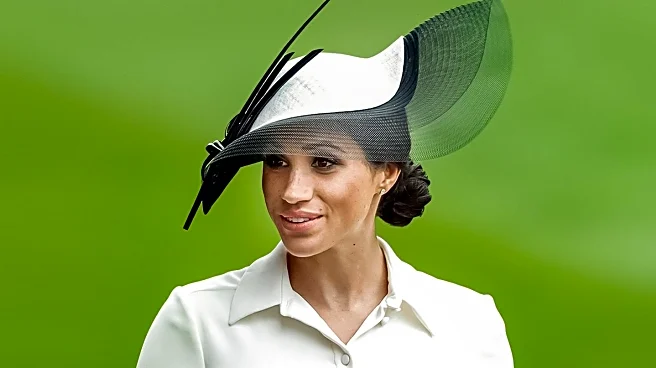What is the story about?
What's Happening?
The Duchess of Kent, Katharine Lucy Mary Worsley, has died at the age of 92, as announced by Buckingham Palace. Known for her compassionate approach, she famously broke royal protocol by hugging a Wimbledon runner-up. She was married to Prince Edward, Duke of Kent, and was a cousin to the late Queen Elizabeth II. The Duchess was recognized for her dedication to music, having taught at a public school in northeast England for over a decade. She founded the charity Future Talent to support young musicians. Her contributions extended beyond music, as she was the first royal to convert to Catholicism in over three centuries and volunteered with the suicide-prevention group Samaritans. Prime Minister Keir Starmer praised her unassuming nature and compassion. The royal family mourns her loss, highlighting her lifelong devotion to various organizations and her empathy for young people.
Why It's Important?
The Duchess of Kent's passing marks the end of an era for the British royal family, as she was a figure who bridged traditional royal duties with modern humanitarian efforts. Her work in music education and mental health advocacy reflects broader societal values, emphasizing the importance of arts and mental health support. Her conversion to Catholicism was a significant historical moment, indicating a shift in religious acceptance within the royal family. Her legacy in music and charity work continues to inspire similar initiatives, potentially influencing public policy and societal attitudes towards arts education and mental health support.
What's Next?
The royal family and associated organizations are expected to continue honoring the Duchess's legacy through ongoing support for music and mental health initiatives. Future Talent, the charity she founded, may see increased attention and support as her contributions are remembered. The royal family may also engage in public commemorations, reflecting on her impact and encouraging similar humanitarian efforts. The Duchess's passing may prompt discussions on the role of royals in modern society, particularly in areas of social advocacy and education.
Beyond the Headlines
The Duchess's life and work highlight the evolving role of the British monarchy in contemporary society, balancing tradition with personal passions and public service. Her choice to teach music anonymously reflects a shift towards humility and direct community engagement by royals. Her conversion to Catholicism and volunteer work with Samaritans suggest a broader acceptance and integration of diverse religious and social values within the royal family. These actions may influence cultural perceptions of the monarchy, encouraging a more inclusive and service-oriented image.















